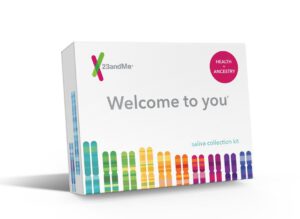Best Buy, the big box retailer, just became the latest store to start selling 23andMe kits on its shelves.
Customers can now find the kits on Amazon, at CVS, and Target. Going beyond online sales is all part of our effort to make the product more readily available to consumers.
Over on the Best Buy blog, 23andMe’s vice president of consumer marketing and acquisition, Jon Ward, explained a little about our service and the decision to sell on store shelves as well as online.
Here’s what he said:
How does 23andMe differ from traditional genetic testing?
We really pride ourselves on taking complex, powerful technologies and making them relevant to consumers. We try to keep things as easy as possible for people. The instructions for how to handle the saliva tube are very clear, and shipping the kit back to us is prepaid. The customer doesn’t see the most complicated parts — extracting the DNA, genotyping someone’s sample and running the data through our systems to interpret the relevant information. That all happens behind the scenes.
How many people have used 23andMe?
More than 2 million in 60 countries. We’ve been at this for 11 years, but our growth has really started accelerating recently.
 You can get a better understanding of yourself and your place in the world. A lot of people are looking at health. They want insights into how they can live longer and healthier lives. There’s another group who’s very interested in ancestry and their families. Those people want to know where they’re from and who they might be related to. They want to know any surprises or interesting tidbits that might not have been captured in their family story. And the third big area, honestly, is people who just want to know more about themselves. They’re not really sure what they’re going to get.
You can get a better understanding of yourself and your place in the world. A lot of people are looking at health. They want insights into how they can live longer and healthier lives. There’s another group who’s very interested in ancestry and their families. Those people want to know where they’re from and who they might be related to. They want to know any surprises or interesting tidbits that might not have been captured in their family story. And the third big area, honestly, is people who just want to know more about themselves. They’re not really sure what they’re going to get.
Why is Best Buy a good fit for this product?
We believe Best Buy has an audience of early adopters — people who are very open to new technologies that help them live better lives. And we think it fits with a lot of the emerging categories at Best Buy, like mobile and health tech.
Have you taken the test? What did you learn from it?
Yes. I learned I’m a carrier for a hearing disease called Pendred Syndrome, which, if my wife were a carrier, we might have a deaf child. So that’s pretty interesting. I know I’m not a carrier for cystic fibrosis or Tay Sachs or any of the other 40-plus carrier diseases. I also found out that based on my genetics I’m more likely to be lactose intolerant. I had no idea, but now I’ve been able to change how I eat. And I found out that I am 1 percent Ashkenazi Jewish. Who knew?
What are some of the less serious — more fun — things you can learn?
There are a whole bunch of things people find interesting. We know things like how likely you are to move during your sleep, or whether you prefer sweet or salty snacks. We can tell you if you’re likely to have a bald spot, cheek dimples or a cleft chin. We assess your most likely eye color and how likely you are to have red hair or curly hair. We can tell you if you’re likely to have photic sneeze reflex, which causes you to sneeze when you look into the sun.
You mentioned that you can test for a person’s genetic health risk for diseases like Parkinson’s and late-onset Alzheimer’s. What type of response have you seen from consumers?
We’ve seen a lot of interest in those diseases. People with Alzheimer’s and Parkinson’s in their families want to look into their risks so they can understand the latest research and maybe make lifestyle changes to help to the extent they can mitigate the onset of the disease.
What do you do once you get your results? 
A lot of people print their results and go right to their doctor. If you’re negative for every carrier disease, that doesn’t necessarily mean you’re completely in the clear. But it’s a good baseline test for some of the most common variants associated with those diseases. If you’re considering having children, you’ll want more comprehensive screening done. And if you have one of the variants we test for, you’ll probably want to have additional testing, have your partner tested and have a family-planning discussion to make sure you know what you’d do if you had a child who had one of those diseases. And, for example, if you’re positive for the genetic mutation associated with late-onset Alzheimer’s, we will point you to resources we’ve curated on our website where you can learn more about the disease.
A lot of this information is very personal. How do you protect customer privacy?
We wouldn’t have a business if we didn’t protect people’s information. We have state-of-the-art security and privacy policies, and we have a full-time privacy officer. We give people enormous control. If you want, you can download your data and close your account at any time.
The test results can have a big impact on someone’s life. What are some of your favorite customer stories?
The stories that always get me are the ones where people have discovered long-lost relatives on 23andMe. We have an optional feature called DNA Relatives that, if you choose to participate, will match you with others in the database who share DNA segments—from distant cousins to close relatives. There was a story where a half-brother and sister discovered each other mid-life. I think they were both only children, but all of a sudden their family opened up. Another one was a story about a woman named Angel who had been given up for adoption, and we helped reunite her with her family for Christmas. She was probably in her 60s and suddenly she has this big, fully formed family she didn’t know she had. It’s just very moving.